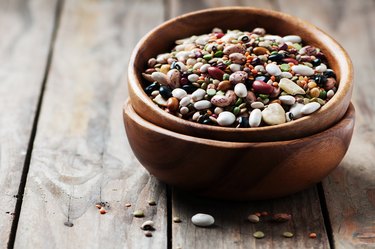
Despite its name, a vegetarian diet doesn't have to center around vegetables. From legumes to soy to whole grains, there are a number of healthful foods that a vegetarian can eat. However, vegetables provide so many health benefits that a vegetarian should try unfamiliar varieties and new cooking methods in an effort to incorporate more produce into his diet.
Vegetarianism Beyond Vegatables
Video of the Day
Just like omnivores, vegetarians need to consume a balance of carbohydrates, protein and fat, each of which can be found in foods other than vegetables. It's a myth that vegetarians can't get enough healthy protein sources without eating meat -- soy and quinoa both contain all the essential amino acids, making them complete proteins. Lentils and beans also contain vegetarian protein and serve as a source of carbohydrates, while nuts, seeds and dairy products are both protein and fat sources. Incorporate whole grains into your diet, too, as another way to get complex carbohydrates.
Video of the Day
Trying New Vegetables
Don't rule out vegetables entirely -- it's possible that you haven't found the right vegetable or cooking method. Each time you shop, pick one unfamiliar type of vegetable and research how to prepare it. For example, leafy greens go beyond lettuce; try bok choy, kale or collard greens instead. If you're not a fan of carrots, try other types of root vegetables such as turnips or parsnips. Head to the farmers market, where you might find additional unfamiliar vegetables. Your preparation method could be lacking, too. If you grew up on canned or frozen vegetables, such as mushy canned green beans, experiment with sautéing, grilling or roasting vegetables. For example, Brussels sprouts have an entirely different taste when roasted at high heat rather than boiled.
Nutrients You Need
In undertaking a vegetarian diet without vegetables, you limit the number of nutrients you're eating per day. While you can supplement, it's best to get your vitamins and minerals from whole foods. Key nutrients in produce include fiber, folate, iron, magnesium, potassium and vitamins A and C. While you work on getting used to eating more vegetables, look for alternate sources. For example, you can get fiber from whole grains and iron from pumpkins, sesame seeds and lentils. Almonds are a source of magnesium, while you can get potassium from white beans, baked potatoes and dried apricots. Try kiwi, guavas and strawberries for vitamin C and cantaloupe, mangoes and dried apricots for vitamin A.
The Junk Food Trap
The cause of becoming overweight as a vegetarian is the same as for omnivores -- too many calories, potentially in the form of junk food. When you're hungry yet limited in what you eat, it's tempting to turn to junk food such as pizza, french fries and potato chips. Resist this urge -- snack on nuts, low-fat dairy and fresh fruit. Plan out your meals in advance to ensure you're getting the nutrients you need for health.
- U.S. News and World Report: Vegetarian? 6 Tips for a Healthy Vegetarian Diet
- Fruits and Veggies More Matters: Key Nutrients in Fruits and Vegetables
- Office of Dietary Supplements: Magnesium
- Health-A-Liciousness: Top 10 Foods Highest in Potassium
- Health-A-Liciousness: Top 10 Foods Highest in Vitamin C
- Health-A-Liciousness: Top 10 Foods Highest in Vitamin A
- Fruits and Veggies More Matters: Bored? Try Something New!